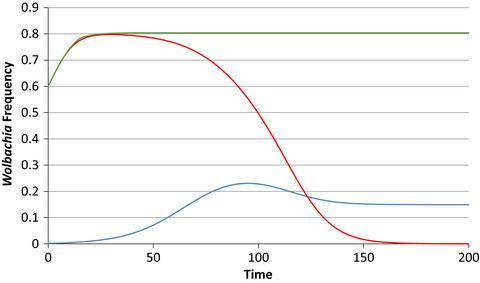当前位置:
X-MOL 学术
›
J. Evol. Biol.
›
论文详情
Our official English website, www.x-mol.net, welcomes your
feedback! (Note: you will need to create a separate account there.)
Alternative evolutionary outcomes following endosymbiont‐mediated selection on male mating preference alleles
Journal of Evolutionary Biology ( IF 2.1 ) Pub Date : 2020-02-21 , DOI: 10.1111/jeb.13602 Antje Hundertmark 1 , Sara L Goodacre 1 , John F Y Brookfield 1
Journal of Evolutionary Biology ( IF 2.1 ) Pub Date : 2020-02-21 , DOI: 10.1111/jeb.13602 Antje Hundertmark 1 , Sara L Goodacre 1 , John F Y Brookfield 1
Affiliation

|
In many arthropods, intracellular bacteria, such as those of the genus Wolbachia, may spread through host populations as a result of cytoplasmic incompatibility (CI). Here, there is sterility or reduced fertility in crosses between infected males and uninfected females. As the bacterium is maternally inherited, the reduced fertility of uninfected females increases the frequency of the infection. If the transmission fidelity of the bacterium is less than 100%, the bacterium cannot invade from a low frequency, but if its frequency exceeds a threshold, it increases to a high, stable, equilibrium frequency. We explore the expected evolutionary dynamics of mutant alleles that cause their male bearers to avoid mating with uninfected females. For alleles which create this avoidance behaviour conditional upon the male being infected, there is a wide zone of parameter space that allows the preference allele to drive Wolbachia from the population when it would otherwise stably persist. There is also a wide zone of parameter space that allows a joint stable equilibrium for the Wolbachia and a polymorphism for the preference allele. When the male's avoidance of uninfected females is unconditional, the preference allele's effect on Wolbachia frequency is reduced, but there is a narrow range of values for the transmission rate and CI fertility that allow an unconditional preference allele to drive Wolbachia from the population, in a process driven by positive linkage disequilibrium between Wolbachia and the preference allele. The possibility of the evolution of preference could hamper attempts to manipulate wild populations through Wolbachia introductions.
中文翻译:

内共生体介导的雄性交配偏好等位基因选择后的替代进化结果
在许多节肢动物中,由于细胞质不相容性 (CI),细胞内细菌,例如 Wolbachia 属的细菌,可能会在宿主种群中传播。在这里,受感染的雄性和未受感染的雌性之间的杂交不育或生育力降低。由于该细菌是母系遗传的,未感染雌性的生育力降低会增加感染的频率。如果细菌的传输保真度低于100%,则细菌无法从低频侵入,但如果其频率超过阈值,则增加到高、稳定、平衡的频率。我们探索了突变等位基因的预期进化动力学,这些基因导致雄性携带者避免与未感染的雌性交配。对于以男性被感染为条件产生这种回避行为的等位基因,有一个广泛的参数空间区域,允许偏好等位基因将 Wolbachia 从群体中驱逐出去,否则它会稳定地持续存在。还有一个广泛的参数空间区域,允许 Wolbachia 的联合稳定平衡和偏好等位基因的多态性。当男性无条件避免未感染的女性时,偏好等位基因对沃尔巴克氏体频率的影响会降低,但传播率和 CI 生育率的值范围很窄,允许无条件偏好等位基因从人群中驱除沃尔巴克氏体,在一个由 Wolbachia 和偏好等位基因之间的正连锁不平衡驱动的过程。偏好进化的可能性可能会阻碍通过引入沃尔巴克氏菌来操纵野生种群的尝试。
更新日期:2020-02-21
中文翻译:

内共生体介导的雄性交配偏好等位基因选择后的替代进化结果
在许多节肢动物中,由于细胞质不相容性 (CI),细胞内细菌,例如 Wolbachia 属的细菌,可能会在宿主种群中传播。在这里,受感染的雄性和未受感染的雌性之间的杂交不育或生育力降低。由于该细菌是母系遗传的,未感染雌性的生育力降低会增加感染的频率。如果细菌的传输保真度低于100%,则细菌无法从低频侵入,但如果其频率超过阈值,则增加到高、稳定、平衡的频率。我们探索了突变等位基因的预期进化动力学,这些基因导致雄性携带者避免与未感染的雌性交配。对于以男性被感染为条件产生这种回避行为的等位基因,有一个广泛的参数空间区域,允许偏好等位基因将 Wolbachia 从群体中驱逐出去,否则它会稳定地持续存在。还有一个广泛的参数空间区域,允许 Wolbachia 的联合稳定平衡和偏好等位基因的多态性。当男性无条件避免未感染的女性时,偏好等位基因对沃尔巴克氏体频率的影响会降低,但传播率和 CI 生育率的值范围很窄,允许无条件偏好等位基因从人群中驱除沃尔巴克氏体,在一个由 Wolbachia 和偏好等位基因之间的正连锁不平衡驱动的过程。偏好进化的可能性可能会阻碍通过引入沃尔巴克氏菌来操纵野生种群的尝试。











































 京公网安备 11010802027423号
京公网安备 11010802027423号